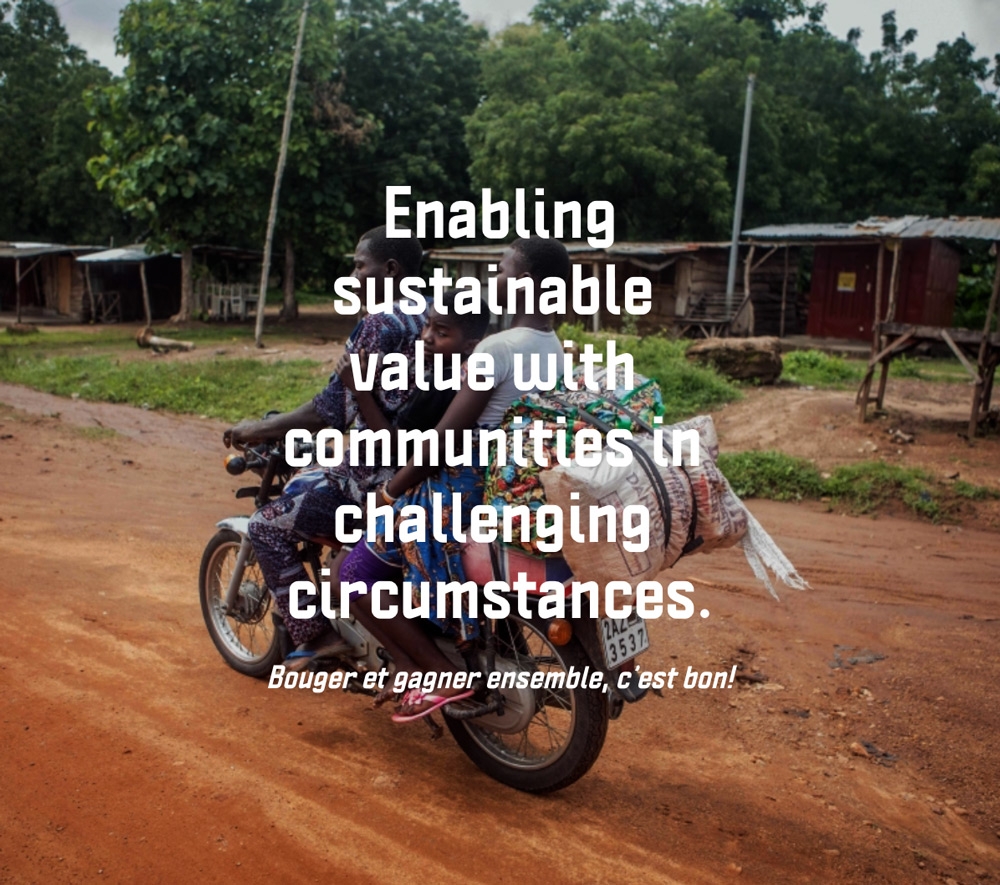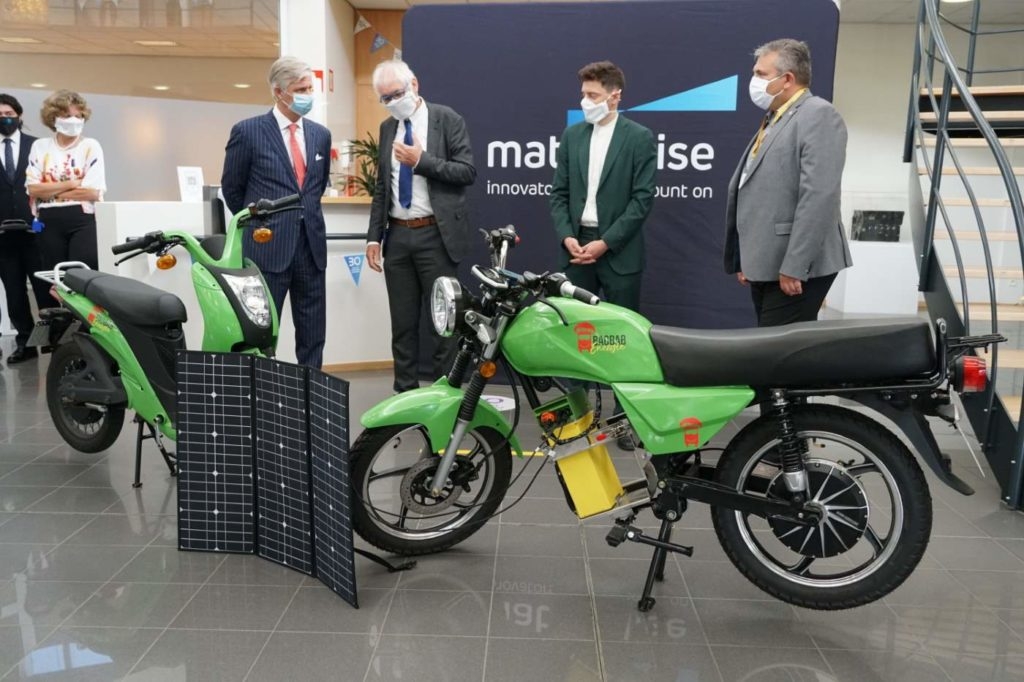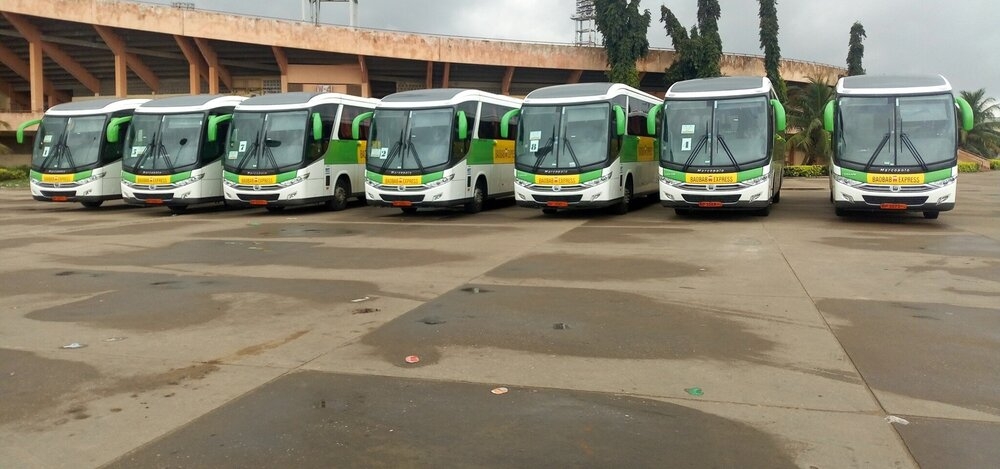What does the client do?
After successfully starting a bus transport company in Benin called Baobab Express, providing cheap and reliable transportation as well as jobs to more than 200 people locally, they wanted to take things further and start solving some of the energy issues.
Baobab Express is building up an ecosystem of energy solutions based around a self-developed rechargeable battery capable of powering everything from electric motorbikes to household devices like lights, smartphones, fridges, ... basically anything running of 12V. The first step, after developing the battery, is to run a pilot using the battery in off-the-shelf electric motorcycles and scooters. Alongside this, they are experimenting with solar powered recharge solutions. This is where African Drive came to life.
Just like Baobab Express is now a profitable company fully managed by local people, Baobab Energie could one day become a regional player in other countries in Africa.

It might be scary sometimes, but just trust them on what they do.
Jonas Van Eyck, Project leader @ African Drive
What stage are they in?
When we started working with them, the project wasn't much more than idea. First sketches of the hardware were being discussed. We were asked to help out with the client and internal user facing software.
After more than two years of development, together with other partners, we're now running a first pilot in Benin with (X number) motorcycles.
Meanwhile we are helping them with hiring a local team to take over development and maintenance from us.
What was the initial question and what was the goal?
Our first contact with the client was to audit the work a Beninese development agency did for Baobab Express. After that, talks quickly moved to supporting the Baobab Energie project as well.
The initial question was for us to help with the design of the whole ecosystem of apps surrounding the batteries, the mobile app for end-users, a mobile-first web app for the people managing the points-of-sale and recharging station, and a web admin for the support and management team that helps keeping track of the batteries, their location, but also the battery health.
The end goal is for a local team to further develop and maintain the different applications, so madewithlove was asked to help finding that local team and mentor them. We worked with a first candidate team, but they ended up working for Baobab Express full time on a ticketing application.

The services we offered
Audits
We started with an audit of the work done by a local development agency for Baobab Express.
Product management
Because we were involved so early on in the project we were able to make sure the right features were built by helping out with product management .
Designing and developing an application for a market like Benin is never easy. The patterns we know, the experience we assume of our user, the hardware and network availability we consider transparent, all of these had to be reconsidered. Take for example the expectations around payments. A subscription model, which is the default for these kinds of products aimed at rich countries, does not work for Benin. We helped shape the business model, also taking into account what is technically feasible, and came up with a minimal solution for the pilot.
Web development
For the charging and sales point, we developed a mobile-first web app. The people working for Baobab Energie are able to identify users and batteries, through QR-codes, and keep track of inventory.
Using Laravel Nova, we also developed an admin tool that allows more extensive administration of the batteries. Functionalities include:
- Managing the stock of batteries
- See details of a battery's use
- Administration and payment details
- User management
Mobile development
The main interaction point for end-users is an Android app, built using Flutter. We opted for this technology for several reasons: it's easy to take over by local engineers, and it is fully featured and clearly documented.
The end result was a basic Android-only app (Apple products are far too expensive for the local market) that allows users to see the charge of the batteries they have, get information on how to work with the battery and motorcycle, identify themselves at a charging station and see accounting details.

Back-end development
To communicate with the batteries in the field, each of them equipped with a cel phone data connection, we built on top of AWS's IoT platform. This solves most of the issues we could have due to uncertain data connections and infrequent data updates by the batteries.
We then built our own back-end to connect the AWS services with the admin and mobile apps.
Our exit plan?
We developed our part of the ecosystem along side the hardware development, which took almost 2 years in total.
We are already pretty proud on providing an MVP. And right now, the first pilot is happening in Benin. We are waiting for the results of this to see how the project evolves.
The end goal of training a local team to take over is still on the table. While the pilot is running, the team there is also recruiting a development team. We will continue to be involved until the team can take over, providing assessment and training, along with advice on team and product management.
